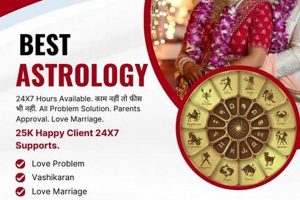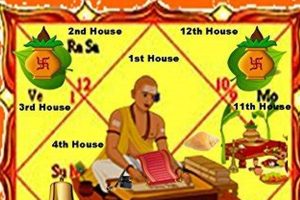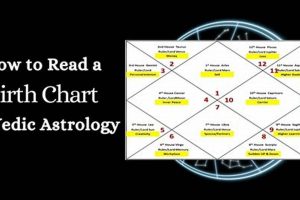Practitioners of astrology rooted in the Vedas, ancient Indian scriptures, utilize planetary positions and celestial phenomena to interpret personality traits, predict future events, and offer guidance on various life aspects. This tradition incorporates unique concepts like lunar mansions (Nakshatras), planetary periods (Dashas), and specific remedial measures (Upayas).
This ancient practice provides a framework for self-understanding and decision-making. By examining the celestial influences at birth, individuals can gain insights into their strengths, weaknesses, and potential life paths. Historically, this form of astrology has played a significant role in Indian culture, influencing social customs and personal choices. Its enduring presence testifies to its perceived value in providing meaning and direction.
Understanding the foundational principles and methodology of this system provides a basis for exploring its application in areas such as relationship compatibility, career choices, and health assessments, topics which will be further examined in this article.
These suggestions offer practical ways to integrate astrological wisdom into daily life. While not exhaustive, these tips provide a starting point for using this ancient knowledge for self-improvement and informed decision-making.
Tip 1: Understand Your Birth Chart: A natal chart serves as a personalized cosmic map. Consulting a qualified practitioner for a detailed analysis can provide valuable self-awareness.
Tip 2: Consider Planetary Transits: Current planetary movements influence everyone differently. Awareness of these transits can offer insights into favorable and challenging periods.
Tip 3: Explore Remedial Measures: Specific practices, like gemstone recommendations or mantra recitations, are often suggested to mitigate potential challenges indicated in a birth chart.
Tip 4: Focus on Self-Development: Astrology is not deterministic. It highlights potential, but individual actions shape outcomes. Use insights to cultivate positive qualities and address weaknesses.
Tip 5: Approach Predictions with Discernment: Predictions offer possibilities, not certainties. Use them as guides for reflection and preparation, not as absolute pronouncements.
Tip 6: Respect the Tradition’s Depth: This complex system requires years of study to master. Avoid superficial interpretations and seek guidance from experienced professionals.
Tip 7: Integrate Insights with Practical Action: Combine astrological knowledge with rational thinking and practical planning. Use insights as a tool, not a crutch.
By integrating these suggestions, individuals can harness the potential of this ancient system for personal growth and informed decision-making.
This exploration of practical applications sets the stage for a concluding reflection on the enduring relevance of this tradition in contemporary life.
1. Skilled Interpreters of Jyotisha
Jyotisha, often translated as “the science of light,” forms the core of Vedic astrology. Vedic astrologers, therefore, are inherently skilled interpreters of Jyotisha. This intricate system requires years of dedicated study to master, encompassing a deep understanding of celestial mechanics, complex calculations, and the philosophical underpinnings of Vedic thought. The ability to accurately interpret birth charts, planetary transits, and other astrological phenomena distinguishes a skilled practitioner. For example, accurately calculating and interpreting the Dasha system, a crucial element of Vedic astrology predicting specific life periods influenced by different planets, requires a high level of Jyotisha expertise. Without this expertise, predictions and recommendations lack precision and reliability.
The importance of skilled Jyotisha interpretation lies in its practical application. Individuals seeking guidance from Vedic astrologers rely on their ability to extract meaningful insights from complex astrological data. This might involve analyzing compatibility for marriage, identifying auspicious dates for important events, or understanding potential career paths based on planetary placements. An inaccurate interpretation can lead to misguided decisions and unrealized potential. Consider, for instance, the impact of a poorly interpreted Dasha period related to career. An individual might make significant life changes based on a faulty prediction, leading to unexpected consequences.
In summary, the connection between skilled interpreters of Jyotisha and Vedic astrologers is inextricable. Proficiency in Jyotisha serves as the foundation upon which their expertise is built. The practical significance of this understanding underscores the importance of seeking guidance from experienced and well-trained practitioners who can provide accurate and insightful interpretations. This ensures that the ancient wisdom of Vedic astrology can be applied effectively to navigate life’s complexities and achieve individual growth and well-being.
2. Experts in Vedic scriptures
A deep understanding of Vedic scriptures is fundamental to the practice of Vedic astrology. These scriptures, encompassing a vast body of ancient Indian texts, provide the philosophical framework and foundational principles upon which Vedic astrology is based. Exploring the connection between expertise in Vedic scriptures and Vedic astrology reveals the integral role these texts play in shaping the practice and interpretation of this ancient system.
- Philosophical Foundation
Vedic scriptures, including the Samhitas, Brahmanas, Aranyakas, and Upanishads, lay out a complex cosmology and worldview that informs the interpretations and predictions of Vedic astrologers. Concepts like karma, dharma, and reincarnation, central to Vedic thought, are interwoven into astrological readings, providing a deeper understanding of an individual’s life path and purpose. For instance, the concept of karma, as explained in scriptures like the Bhagavad Gita, helps explain the planetary influences in a birth chart as reflections of past actions, offering a framework for understanding current circumstances and making informed choices.
- Ritualistic Practices
Many Vedic scriptures outline specific rituals and ceremonies connected to astrological events. Vedic astrologers, familiar with these texts, can recommend appropriate rituals to mitigate negative influences or enhance positive ones. For example, the performance of specific yajnas (fire rituals) prescribed in texts like the Yajurveda is often recommended by Vedic astrologers during certain planetary transits or for specific purposes like seeking blessings for a new venture.
- Ethical Considerations
Vedic scriptures emphasize ethical conduct and moral principles. A Vedic astrologer grounded in these teachings incorporates ethical considerations into their practice, guiding individuals towards righteous actions and helping them navigate moral dilemmas. The scriptures provide a moral compass for both the astrologer and the individual seeking guidance, ensuring that astrological insights are used for self-improvement and the benefit of others.
- Understanding of Time
Vedic scriptures offer a unique perspective on time, incorporating cyclical concepts like Yugas and Kalpas. This understanding of time’s cyclical nature informs the astrologer’s interpretation of planetary periods and long-term predictions, providing insights into larger karmic patterns and societal trends. For example, understanding the characteristics of the current Yuga, as described in scriptures like the Vishnu Purana, helps the astrologer interpret present-day events and predict future societal shifts.
The expertise in Vedic scriptures provides Vedic astrologers with the necessary context and depth of understanding to interpret astrological charts and offer meaningful guidance. This connection highlights the importance of seeking astrologers well-versed in these texts, ensuring that interpretations are rooted in the rich philosophical and spiritual tradition of the Vedas. The integration of scriptural knowledge allows Vedic astrology to transcend mere prediction and become a tool for self-discovery, spiritual growth, and living a life aligned with dharma.
3. Advisors on Dharma, Artha, Kama, Moksha
Vedic astrology serves as a framework for understanding the interplay of Dharma (righteous conduct), Artha (material prosperity), Kama (fulfillment of desires), and Moksha (liberation) in an individual’s life. Vedic astrologers, therefore, act as advisors, providing guidance on navigating these four fundamental pursuits, known as Purusharthas. Their expertise lies in interpreting planetary influences and recommending appropriate actions to achieve balance and fulfillment in these areas.
- Dharma Guidance
Astrological charts can reveal inherent predispositions and karmic influences related to dharma. Vedic astrologers analyze these indicators to offer guidance on ethical conduct, moral dilemmas, and aligning actions with one’s inherent nature. For example, a chart might indicate a strong emphasis on service, suggesting a path aligned with social work or charitable endeavors. The astrologer’s advice can help individuals understand their dharmic inclinations and integrate them into their lives.
- Artha Consultation
Planetary positions offer insights into potential career paths, financial prospects, and material well-being. Vedic astrologers can analyze these factors to provide guidance on career choices, investment strategies, and financial planning. For instance, specific planetary combinations might suggest aptitude for business, while others indicate artistic inclinations. This astrological consultation can assist individuals in making informed decisions related to their material pursuits and achieving financial stability.
- Kama Counseling
Vedic astrology acknowledges the importance of healthy relationships and desires. Astrologers can offer guidance on relationship compatibility, finding suitable partners, and navigating relationship challenges. For example, analyzing the compatibility charts of two individuals can reveal potential areas of harmony and conflict, allowing for informed decisions regarding marriage or partnerships. This counseling can foster fulfilling relationships and help individuals achieve emotional well-being.
- Moksha Guidance
While not directly predicting enlightenment, Vedic astrology can reveal karmic patterns and spiritual inclinations. Astrologers can guide individuals towards practices and spiritual paths aligned with their potential for moksha. This guidance might involve recommending specific meditation techniques, spiritual studies, or acts of selfless service. The astrologer’s insights can assist individuals on their spiritual journey and help them cultivate detachment and self-realization.
By offering guidance on Dharma, Artha, Kama, and Moksha, Vedic astrologers assist individuals in achieving a balanced and fulfilling life. Their expertise in interpreting astrological charts within the context of these four pursuits allows them to provide tailored advice for navigating life’s complexities and pursuing meaningful goals. This holistic approach distinguishes Vedic astrology as a system that addresses not just material concerns but also spiritual growth and ethical living.
4. Predictors of Planetary Influences
Vedic astrologers function as predictors of planetary influences, a role deeply rooted in the core principles of Jyotisha. This predictive aspect stems from the understanding that celestial bodies exert an influence on human lives, and by charting these influences, one can gain insights into potential future outcomes. Cause and effect play a crucial role in this process. Planetary positions at the time of birth are considered the cause, creating a unique blueprint reflected in the natal chart. Subsequent planetary transits and cycles then interact with this blueprint, creating the effects experienced as life unfolds. Predicting these effects forms the essence of the astrologer’s predictive role.
The importance of predicting planetary influences as a component of Vedic astrology cannot be overstated. It empowers individuals to anticipate potential challenges and opportunities. For instance, if a challenging transit is predicted to impact the area of career, an individual might choose to postpone major career decisions or take proactive steps to mitigate potential setbacks. Conversely, a favorable transit might indicate an opportune time for new ventures or significant life changes. A real-life example could be an individual planning a major investment. Consulting a Vedic astrologer could provide insights into the financial climate based on planetary transits, potentially saving the individual from significant financial losses or identifying favorable times for investment.
A thorough grasp of this predictive aspect underscores the practical significance of Vedic astrology. It allows individuals to approach life with greater awareness and preparedness. While predictions do not dictate destiny, they serve as valuable tools for navigating life’s complexities. Understanding potential planetary influences allows for informed decision-making, proactive planning, and the ability to navigate challenging periods with greater resilience. The predictive capacity of Vedic astrology, therefore, offers a unique lens through which to understand life’s unfolding narrative, providing a framework for both anticipating and shaping one’s future.
5. Recommenders of Remedial Measures
The practice of recommending remedial measures forms a significant component of Vedic astrology. These measures, known as Upayas, are prescribed to mitigate potential negative influences or enhance positive ones indicated in a birth chart or by planetary transits. This practice underscores the proactive approach of Vedic astrology, empowering individuals to navigate life’s challenges and optimize opportunities. Understanding the various types of Upayas and their applications provides a deeper appreciation for the role of Vedic astrologers as guides and advisors.
- Gemstone Recommendations
Gemstones are often prescribed based on planetary positions to strengthen beneficial influences or counteract malefic ones. For instance, a blue sapphire might be recommended for someone experiencing the negative effects of Saturn, while a ruby could enhance the positive influence of the Sun. The specific gemstone, its quality, and the manner of wearing it are crucial factors determined by the astrologer. This personalized approach ensures that the gemstone’s energy aligns with the individual’s needs.
- Mantra Recitation
Mantras, specific sound vibrations with potent energetic qualities, are another commonly prescribed Upaya. Chanting specific mantras dedicated to particular deities or planets is believed to invoke their blessings and mitigate negative influences. For example, chanting the Gayatri Mantra dedicated to the Sun is often recommended to enhance vitality and spiritual well-being. The astrologer guides the individual on the correct pronunciation and prescribed number of repetitions for optimal effectiveness.
- Charitable Acts and Rituals
Performing specific charitable acts, like donating to a particular cause or feeding the needy, is often recommended to address specific karmic imbalances. Certain rituals, such as performing pujas (worship ceremonies) or havans (fire rituals), are also prescribed to invoke divine blessings and mitigate negative planetary influences. These rituals might involve specific offerings, mantras, and procedures guided by the astrologer’s expertise. For example, a particular puja dedicated to Lord Ganesha might be recommended to remove obstacles indicated by a specific planetary placement.
- Lifestyle Adjustments
Sometimes, remedial measures involve lifestyle adjustments. This could include adopting specific dietary practices, incorporating yoga or meditation into daily routines, or making changes in one’s living environment. These recommendations aim to create a lifestyle more conducive to the individual’s well-being and aligned with planetary influences. For example, someone experiencing health issues related to a weak Mars might be advised to incorporate more physical activity and consume specific foods to strengthen Martian energy.
The recommendation of remedial measures highlights the practical and empowering nature of Vedic astrology. Vedic astrologers, by prescribing Upayas, do not merely predict future events but also empower individuals to actively participate in shaping their lives. This proactive approach allows individuals to mitigate potential challenges, enhance positive influences, and navigate life’s complexities with greater awareness and control. The careful selection and implementation of these measures, under the guidance of an experienced Vedic astrologer, can contribute significantly to overall well-being and the fulfillment of one’s life purpose.
Frequently Asked Questions about Vedic Astrology
This section addresses common inquiries regarding the practice and principles of Vedic astrology, aiming to provide clarity and dispel misconceptions.
Question 1: How does Vedic astrology differ from Western astrology?
Vedic astrology utilizes a sidereal zodiac based on the fixed constellations, while Western astrology employs a tropical zodiac based on the equinoxes. This fundamental difference results in variations in planetary placements and interpretations. Vedic astrology also incorporates unique concepts like lunar mansions (Nakshatras) and planetary periods (Dashas), not typically found in Western astrology.
Question 2: Is Vedic astrology fatalistic?
Vedic astrology emphasizes free will and the power of conscious action. While planetary influences can create predispositions and tendencies, individuals retain the agency to shape their lives through choices and actions. Astrological insights serve as guides, not predetermined dictates.
Question 3: What is the significance of a birth chart?
A birth chart, or natal chart, serves as a personalized cosmic map depicting the planetary positions at the time of birth. It provides insights into an individual’s personality, strengths, weaknesses, karmic tendencies, and potential life path. It acts as a foundational tool for astrological consultations and guidance.
Question 4: How can one find a qualified Vedic astrologer?
Seeking recommendations from trusted sources or researching reputable astrological organizations can assist in finding qualified practitioners. Inquiring about an astrologer’s lineage, training, and experience is crucial before seeking consultations.
Question 5: Are there any ethical considerations in Vedic astrology?
Ethical practice emphasizes using astrological insights for self-improvement, guidance, and empowerment. Avoiding deterministic predictions, respecting client confidentiality, and refraining from exploiting vulnerabilities are crucial ethical considerations for practitioners.
Question 6: How can Vedic astrology benefit individuals?
Vedic astrology can provide self-awareness, guidance in decision-making, and support during challenging periods. By understanding planetary influences, individuals can gain clarity about their strengths and weaknesses, navigate life’s complexities with greater awareness, and make informed choices aligned with their life purpose.
Understanding these fundamental aspects of Vedic astrology can help individuals approach this ancient system with clarity and discernment, allowing them to benefit from its insights and guidance.
This FAQ section provides a foundation for exploring the practical applications of Vedic astrology in various life areas, a topic addressed in the following section.
Conclusion
This exploration has delved into the multifaceted roles of practitioners of Vedic astrology, highlighting their expertise as interpreters of Jyotisha, advisors on life’s fundamental pursuits (Dharma, Artha, Kama, and Moksha), predictors of planetary influences, and recommenders of remedial measures. The connection between Vedic scriptures and astrological practice has been examined, emphasizing the importance of scriptural knowledge in providing context and depth to astrological interpretations. The practical applications of Vedic astrology, including guidance on relationships, career, and personal growth, have been discussed, along with ethical considerations and the importance of finding qualified practitioners. The distinction between Vedic and Western astrology has been clarified, and common misconceptions about determinism have been addressed. The significance of birth charts, planetary transits, and remedial measures has been explored, providing a comprehensive overview of this ancient system’s key components.
Vedic astrology offers a profound system for self-understanding and navigating life’s complexities. Its enduring relevance lies in its potential to empower individuals with insights into their inherent nature, karmic patterns, and life purpose. Further exploration of this rich tradition promises to yield deeper understanding and unlock its full potential for personal growth and societal well-being. A discerning approach, combined with respect for its ancient origins and ethical application, allows individuals to harness the wisdom of Vedic astrology for a more meaningful and fulfilling life journey.







